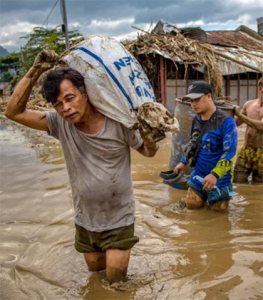Call for climate refugee visas
Refugee advocates have called for a ‘climate humanitarian visa’ to be adopted as an avalanche of new research shows rising temperature will destabilise the climate around the globe, triggering extreme weather and forcing people to flee as refugees.
New reports issued by the US Government have identified the national security risks posed by human-driven climate change.
 Advocacy groups say climate migration is already happening due to crop failures, floods, heatwaves, droughts and wildfires across the globe.
Advocacy groups say climate migration is already happening due to crop failures, floods, heatwaves, droughts and wildfires across the globe.
These events have displaced millions in the past decade and scientists expect that number will only grow.
Climate migration expert Ama Francis, who works with the International Refugee Assistance Project, says a new refugee visa class is needed.
“I think we need a climate-humanitarian visa. And what that would actually mean is that if you are a person from a climate-vulnerable region where you – say you’re a farmer, and your crops have been failing for the last five years, and your family has been starving… you are a refugee,” Ms Francis said.
“The US government would say, OK, there’s a way for you to come and seek shelter here. We understand that it’s really hard for you to sustain life where you are because of climate impacts.
“And so as a first step, the U.S. would define a set of countries that are climate vulnerable. And people from those countries would be off the bat eligible. But then there’d be a second level of eligibility where the most vulnerable people in those countries or regions would actually be the ones to be able to access this visa,” Ms Francis said.
With the UN Climate Change Conference starting shortly in Glasgow, Ms Francis called for a renewed focus and more resources to combat climate migration.
“I think at the UN level, a really big development has been this establishment of a task force on displacement. And that was set up by the Paris Agreement in 2015,” she said.
The Task Force on Displacement released a set of recommendations about how countries can avert and minimize and address displacement. And what we’ve seen is that the conversation about climate displacement has been really sidelined.
“There’s no agenda item that specifically addresses climate displacement. And so even if – these talks that are coming up this year are really centred around this question of survival.
“There’s a lot of steps to getting to governments providing financial resources. That’s definitely part of the answer. But to even get there, we need to have the conversation,” Ms Francis said.
Despite the structural barriers and opposition from nationalist politicians to a coordinated approach to global migration, Ms Francis is optimistic about the future.
“I think the pandemic has been a really hard time for a lot of people…. but it has also shown us that we can change. We can make really massive changes to how we get around or what services look like,” she said.
“And to me, that does give me some hope, because we really see that what happens somewhere else affects us here and that we’re only as strong as the most vulnerable person in our community. At a personal level, I believe that we have it in us to really dig down and make the changes that we need to,” Ms Francis said.
Hear an interview with Ama Francis here: https://www.npr.org/2021/10/24/1048856671/strategist-calls-for-climate-humanitarian-visa-as-answer-to-biden-refugee-report












